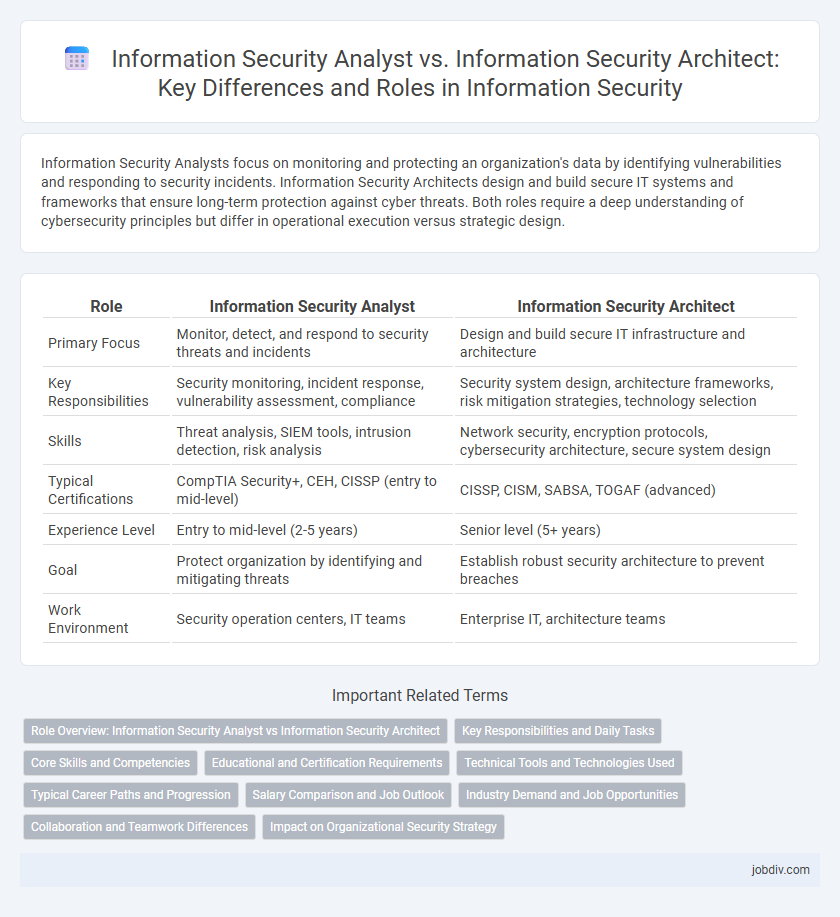Information Security Analysts focus on monitoring and protecting an organization's data by identifying vulnerabilities and responding to security incidents. Information Security Architects design and build secure IT systems and frameworks that ensure long-term protection against cyber threats. Both roles require a deep understanding of cybersecurity principles but differ in operational execution versus strategic design.
Table of Comparison
| Role | Information Security Analyst | Information Security Architect |
|---|---|---|
| Primary Focus | Monitor, detect, and respond to security threats and incidents | Design and build secure IT infrastructure and architecture |
| Key Responsibilities | Security monitoring, incident response, vulnerability assessment, compliance | Security system design, architecture frameworks, risk mitigation strategies, technology selection |
| Skills | Threat analysis, SIEM tools, intrusion detection, risk analysis | Network security, encryption protocols, cybersecurity architecture, secure system design |
| Typical Certifications | CompTIA Security+, CEH, CISSP (entry to mid-level) | CISSP, CISM, SABSA, TOGAF (advanced) |
| Experience Level | Entry to mid-level (2-5 years) | Senior level (5+ years) |
| Goal | Protect organization by identifying and mitigating threats | Establish robust security architecture to prevent breaches |
| Work Environment | Security operation centers, IT teams | Enterprise IT, architecture teams |
Role Overview: Information Security Analyst vs Information Security Architect
Information Security Analysts concentrate on monitoring and protecting an organization's computer systems by identifying vulnerabilities, analyzing threats, and responding to security incidents. Information Security Architects are responsible for designing and implementing robust security frameworks that align with organizational goals and regulatory requirements, often focusing on long-term security infrastructure planning. Both roles collaborate to ensure comprehensive protection, with Analysts focusing on operational security and Architects on strategic security design.
Key Responsibilities and Daily Tasks
Information Security Analysts monitor and respond to security incidents, conduct vulnerability assessments, and implement protective measures to safeguard organizational data. Information Security Architects design and develop secure network and system infrastructures, define technical standards, and create security policies to prevent breaches. Analysts focus on real-time threat detection and mitigation, while architects emphasize strategic planning and the implementation of comprehensive security frameworks.
Core Skills and Competencies
Information Security Analysts specialize in monitoring, analyzing, and responding to security incidents, requiring expertise in threat detection, risk assessment, and vulnerability management. Information Security Architects focus on designing and implementing secure network systems and infrastructure, emphasizing skills in security frameworks, system architecture, and compliance standards. Both roles demand proficiency in cybersecurity tools, encryption methodologies, and regulatory knowledge but diverge in operational versus strategic competencies.
Educational and Certification Requirements
Information Security Analysts typically require a bachelor's degree in cybersecurity, computer science, or a related field, often complemented by certifications such as CompTIA Security+, Certified Information Systems Security Professional (CISSP), or Certified Ethical Hacker (CEH). Information Security Architects generally need advanced degrees or significant experience in cybersecurity combined with specialized certifications like CISSP-ISSAP (Information Systems Security Architecture Professional) or Certified Cloud Security Professional (CCSP) to design and implement complex security infrastructures. Both roles benefit from continuous education and staying updated with evolving security standards and technologies.
Technical Tools and Technologies Used
Information Security Analysts primarily utilize tools such as intrusion detection systems (IDS), Security Information and Event Management (SIEM) platforms, antivirus software, and vulnerability scanners to monitor and respond to security incidents. Information Security Architects focus on designing comprehensive security frameworks using technologies like firewalls, encryption protocols, identity and access management (IAM) systems, and secure network architecture solutions. Both roles leverage automation tools and security analytics but differ in scope, with analysts concentrating on operational defense and architects on strategic design and implementation.
Typical Career Paths and Progression
Information Security Analysts typically begin with roles in IT support or junior security positions, advancing through certifications like CISSP and gaining experience in risk assessment and threat analysis. Information Security Architects often start as security engineers or analysts, moving into design and implementation of complex security systems with an emphasis on architecture frameworks and policy development. Career progression for Analysts leads to senior security roles or management, while Architects advance towards strategic leadership roles such as Chief Information Security Officer (CISO) or enterprise security architects.
Salary Comparison and Job Outlook
Information Security Analysts earn a median salary of approximately $103,000 annually, with job growth projected at 35% through 2031 due to rising cyber threats. Information Security Architects command higher salaries, averaging around $130,000 per year, driven by their expertise in designing complex security systems, and their demand is also expected to grow significantly. Both roles offer strong job security, yet Architects typically have more advanced responsibilities and compensation reflecting their specialized skills.
Industry Demand and Job Opportunities
Information Security Analysts experience strong industry demand due to their critical role in monitoring and responding to cybersecurity threats, with the U.S. Bureau of Labor Statistics projecting a 35% job growth rate through 2031. Information Security Architects also face high demand, especially in sectors prioritizing advanced network security design and implementation, with competitive salaries reflecting their specialized skill set. Both roles offer robust job opportunities, but architects typically require more experience and technical expertise, commanding higher compensation in enterprise environments.
Collaboration and Teamwork Differences
Information Security Analysts focus on threat detection and incident response, working closely with IT teams to ensure vulnerabilities are addressed promptly through collaborative monitoring and analysis. Information Security Architects design comprehensive security frameworks, collaborating primarily with executives and development teams to integrate security controls into system architectures. The difference in collaboration lies in Analysts operating on a tactical level with operational teams, while Architects engage strategically across multiple departments to align security designs with business objectives.
Impact on Organizational Security Strategy
Information Security Analysts focus on monitoring and responding to security threats, ensuring real-time protection and compliance with policies to mitigate risks effectively. Information Security Architects design and implement comprehensive security frameworks that align with organizational goals, creating resilient infrastructure for long-term defense. Both roles collaboratively enhance organizational security strategy, with Analysts providing tactical response and Architects delivering strategic security planning.
Information Security Analyst vs Information Security Architect Infographic

 jobdiv.com
jobdiv.com